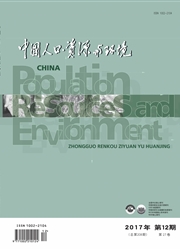

 中文摘要:
中文摘要:
随着城市规模的不断扩大,城市住房紧张、交通拥堵、环境恶化等问题开始日益凸显,如何从生态视角找到适度的城市规模是我国新型城镇化建设中面临的一个重要问题。本文以中国2003-2013年281个地级市为研究对象,通过建立空间计量和门槛面板模型研究了城市规模对生态效率的影响及其区域差异,研究结果表明,中国城市生态效率整体呈现逐渐上升的趋势,且区域差异较大,溢出效应较为明显;城市规模对生态效率的影响呈现N型曲线的特征,且呈现显著的区间效应,根据门槛内生性分类结果发现,当城市规模低于54.48万人时,生态效率随城市规模的扩张不断增加;当城市规模大于54.48万低于337.22万人时,城市规模扩张对生态效率的促进作用较大,当城市规模超过337.22万人这一门槛值之后,促进作用开始显著减小,说明基于生态效率的最优城市规模为337.22万人左右;而产业结构、技术水平等都对城市生态效率有明显的促进作用。基于以上结论,各城市应加强环境合作,减少环境污染溢出;对于规模较小的城市,应该依托周边大中城市,争取产业合作,通过完善城市基础设施建设,进行户籍、土地等制度改革,促进城市规模的扩大;对于规模居中的城市,应该以节约资源、保护环境为前提,推进适度规模的城镇化,真正实现城市从"量"到"质"的转变;对于规模较大的城市,可以建立新城区或城市群,完善城市近郊及周边交通、教育等公共资源配置,充分发挥聚集和发散效应,有效缓解人口过于集中和环境恶化带来的压力。综上,不同规模的城市应采取不同措施提高生态效率,推进城市走集约、智能、绿色、低碳的新型城镇化道路。
 英文摘要:
英文摘要:
With the continuous expansion of urban scale,many problems,such as urban housing shortage,heavy traffic and environmental degradation,have become increasingly prominent. Therefore,one important issue that we face in the construction of new urbanization is how to find the modest size of cities from the ecological perspective. Based on Chinese 281 city’s Panel Data,from2003 to 2013,by establishing spatial econometric and threshold panel model,this paper studies the effects of urban scale on ecoefficiency and its regional differences. The findings show that,China’s urban eco-efficiency show a gradual upward trend,and the regional differences is large,the spillover effect is more obvious. The curve of the relationship between urban scale and eco-efficiency is N-shaped curve,and show a significant interval effect. According to the endogenous classification results of threshold model,the eco-efficiency presents upward trend with the expansion of urban scale when the urban scale is less than 544. 8 thousand,while the expansion of the urban scale has greater promotion to the eco-efficiency when the urban scale is between 544. 8 thousand and 3. 3722 million,and the promotion begins to significantly decrease when the urban scale exceeds the threshold value of 3. 3722 million,which shows that the optimal city size is about 3. 3722 million based on the perspective of eco-efficiency. Also,the industrial structure and technology level both have obvious promoting effect on the urban eco-efficiency. Based on the results above,cities should strengthen environmental cooperation to should strengthen environmental cooperation to reduce environmental pollution spill. The smaller cities should rely on neighboring cities and strive to industrial cooperation,improve urban infrastructure,reform of the household registration,land and other systems,which contribute to the expansion of city size. The medium-sized cities should be to conserve resources and protect the environment as a precondition,and promote appropriate scale urbanizati
 同期刊论文项目
同期刊论文项目
 同项目期刊论文
同项目期刊论文
 期刊信息
期刊信息
